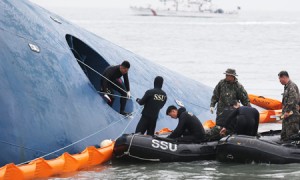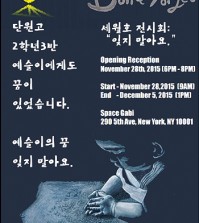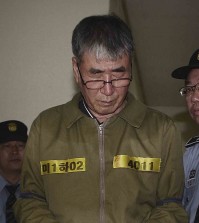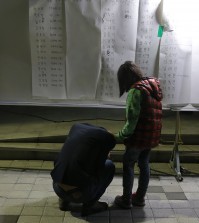- California Assembly OKs highest minimum wage in nation
- S. Korea unveils first graphic cigarette warnings
- US joins with South Korea, Japan in bid to deter North Korea
- LPGA golfer Chun In-gee finally back in action
- S. Korea won’t be top seed in final World Cup qualification round
- US men’s soccer misses 2nd straight Olympics
- US back on track in qualifying with 4-0 win over Guatemala
- High-intensity workout injuries spawn cottage industry
- CDC expands range of Zika mosquitoes into parts of Northeast
- Who knew? ‘The Walking Dead’ is helping families connect
Lost “golden hour” raised ferry casualties
By Jun Ji-hye

Members of the Navy’s ship salvage unit (SSU) search Thursday for missing passengers who were on a ferry that sank off the southwestern coast Wednesday morning. / Yonhap
The “golden hour” is a medical term referring to the time in which rescue personnel need to start treating a patient to give them the best chance at survival.
That first 60 minutes is so much more critical in the event of a maritime disaster because the sooner rescue personnel get to vessel following a distress signal, the more people they can save.
As hope for the survival of the missing is fading, criticism is mounting against the government and the rescue teams for wasting that crucial “golden hour,” when the ferry Sewol was sinking on Wednesday morning.
Rescue helicopters came to the site at about 9:40 a.m., about 50 minutes after the Mokpo Coast Guard Station first received a distress signal.
However, they were not much help as they could not approach the sinking vessel. Divers were also unable to conduct rescue operations actively as the necessary equipment did not arrive with them.
While authorities were scrambling in confusion, the vessel sank with only the lower bow remaining above the water off the southwest coast.
The families of the missing bombarded the Coast Guard with complaints about its complacent circumstantial judgment. They said the agency did not fully mobilize manpower and all the tug boats near the location of the accident in that initial stage of the rescue operation.
According to daily log of the Coast Guard, the ferry Sewol remained above water for 93 minutes after sending off an SOS at 8:58 a.m. The ship listed by about 60 degrees at 9.50 a.m., and totally capsized at 10:41 a.m.
“Marine accidents are extremely and exceptionally difficult to cope with than other incidents. But if the captain of the vessel and the government judged the situation properly and made more effective, swift countermeasures, they could have reduced the number of victims,” said Lee Eun-bang, a professor of Coast Guard studies at the Korea Maritime University.
At a time of the sinking, the rescue team focused more on those moving out of the vessel, while nearly 300 people were trapped inside.
The Coast Guard also failed to deploy its special forces, who are trained to enter a sinking vessel where the tidal current is strong, to rescue people as soon as possible.
“The government needs to set up a more effective disaster countermeasure system for marine accidents. Training for real world situations is urgently necessary,” Lee said.















